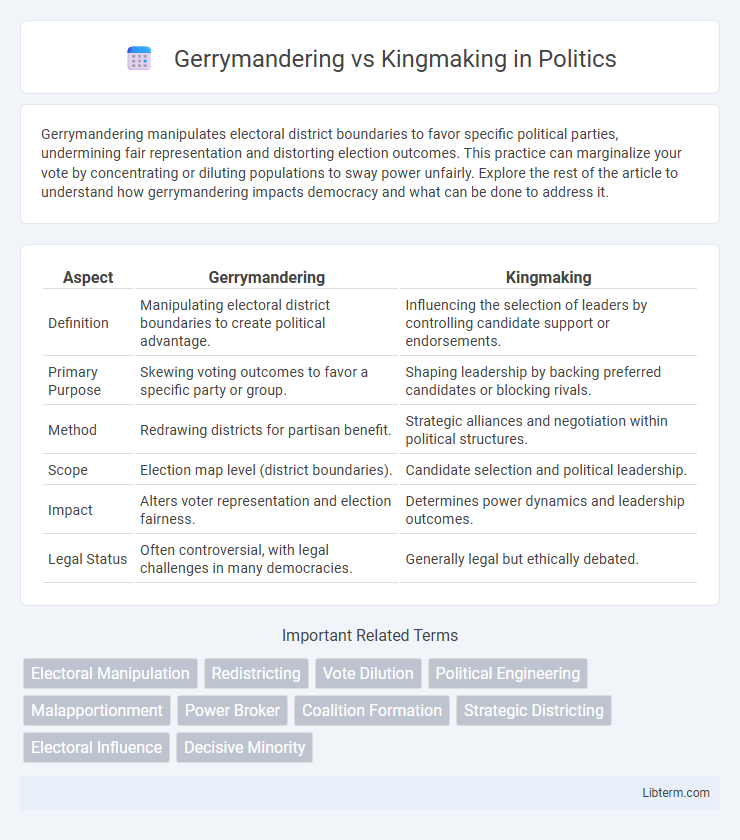Gerrymandering manipulates electoral district boundaries to favor specific political parties, undermining fair representation and distorting election outcomes. This practice can marginalize your vote by concentrating or diluting populations to sway power unfairly. Explore the rest of the article to understand how gerrymandering impacts democracy and what can be done to address it.
Table of Comparison
| Aspect | Gerrymandering | Kingmaking |
|---|---|---|
| Definition | Manipulating electoral district boundaries to create political advantage. | Influencing the selection of leaders by controlling candidate support or endorsements. |
| Primary Purpose | Skewing voting outcomes to favor a specific party or group. | Shaping leadership by backing preferred candidates or blocking rivals. |
| Method | Redrawing districts for partisan benefit. | Strategic alliances and negotiation within political structures. |
| Scope | Election map level (district boundaries). | Candidate selection and political leadership. |
| Impact | Alters voter representation and election fairness. | Determines power dynamics and leadership outcomes. |
| Legal Status | Often controversial, with legal challenges in many democracies. | Generally legal but ethically debated. |
Introduction to Gerrymandering and Kingmaking
Gerrymandering is the process of manipulating electoral district boundaries to favor a particular political party or group, often resulting in unrepresentative election outcomes. Kingmaking refers to the practice where influential individuals or groups decisively determine a winner in an election or selection process without being a candidate themselves. Both tactics impact democratic fairness, with gerrymandering distorting voter representation and kingmaking concentrating power behind the scenes.
Historical Origins of Gerrymandering
Gerrymandering originated in 1812 when Massachusetts Governor Elbridge Gerry approved a redistricting plan designed to benefit his political party by manipulating district boundaries. The term combines Gerry's name with "salamander," describing the distorted shape of one manipulated district. Unlike kingmaking, which involves appointing or influencing successors in a power hierarchy, gerrymandering focuses on electoral map manipulation to secure partisan advantages.
The Concept of Kingmaking in Politics
Kingmaking in politics refers to the influential role played by individuals or groups who possess the power to determine election outcomes without seeking office themselves. This concept highlights the strategic manipulation of voting blocs or coalitions to install preferred candidates, often shaping leadership and policy decisions behind the scenes. Unlike gerrymandering, which involves redrawing electoral boundaries to favor certain parties, kingmaking operates through political alliances, endorsements, and bargaining to influence power dynamics within a government.
Gerrymandering: Methods and Impact
Gerrymandering involves manipulating electoral district boundaries to favor a particular political party or group, employing methods like cracking, which dilutes opposition votes across many districts, and packing, which concentrates them into a few. These tactics distort representative democracy by entrenching power, reducing electoral competitiveness, and weakening the influence of minority voters. The impact includes skewed election outcomes, decreased public trust in the political system, and challenges to fair policy-making processes.
Kingmaking: Strategies and Influence
Kingmaking involves strategically empowering specific candidates or factions to shape election outcomes without directly seeking office, often through leveraging political alliances, negotiation, and resource control. Key strategies include mobilizing voter blocs, orchestrating tactical withdrawals, and influencing party nominations to ensure favored contenders gain advantage. This form of influence significantly impacts democratic processes by altering candidate viability and election dynamics behind the scenes.
Comparing Power Dynamics: Gerrymandering vs Kingmaking
Gerrymandering manipulates electoral district boundaries to concentrate or dilute voting power, enabling political parties to secure disproportionate representation. Kingmaking involves influential individuals or factions who control leadership selection behind the scenes, often bypassing direct voter influence. Both tactics alter democratic power dynamics by undermining fair representation, yet gerrymandering operates through structural electoral manipulation while kingmaking leverages interpersonal networks and political alliances.
Legal and Ethical Implications
Gerrymandering involves manipulating electoral district boundaries to favor a particular party, raising serious legal concerns about violating the Equal Protection Clause and undermining democratic principles. Kingmaking, the act of influential individuals or groups deciding leadership outcomes behind the scenes, poses ethical challenges related to transparency, fairness, and the subversion of voter sovereignty. Both practices threaten electoral integrity by distorting representation and eroding public trust in democratic processes.
Real-World Examples of Gerrymandering
Gerrymandering manipulates electoral district boundaries to favor a particular party or group, as seen in North Carolina's 2016 congressional map that skewed representation despite near-equal votes. In contrast, kingmaking involves power brokers influencing candidate selection or leadership outcomes behind the scenes, often in political party conventions. Real-world gerrymandering cases, like Maryland's 3rd congressional district, demonstrate how geographic tweaks can disproportionately impact electoral fairness and policy outcomes.
Notable Cases of Kingmaking in History
Notable cases of kingmaking in history include the influence of the Earl of Warwick during the Wars of the Roses, who played a pivotal role in placing Edward IV on the English throne. Another prominent example is Cardinal Richelieu in 17th-century France, whose political maneuvering helped strengthen the reign of Louis XIII. These instances highlight how kingmakers have shaped political power behind the scenes, contrasting with gerrymandering, which manipulates electoral boundaries to influence legislative outcomes.
Solutions and Reforms for Fair Representation
Independent redistricting commissions reduce gerrymandering by creating impartial electoral maps based on demographic data and community interests, enhancing fair representation. Implementing ranked-choice voting empowers voters to select genuine preferences, diminishing kingmaking by mitigating strategic manipulation and improving electoral outcomes. Transparency mandates and judicial oversight ensure accountability, promoting equitable political competition and safeguarding democratic integrity.
Gerrymandering Infographic

 libterm.com
libterm.com